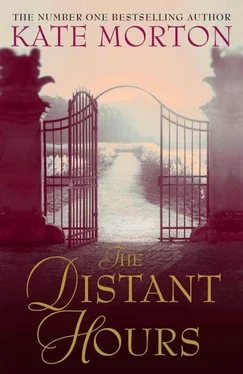With the exception of the time she’d dyed Saffy’s hair blue, Emily had borne the esteemed title of Favourite Cousin throughout the Blythe twins’ childhood. That her only challenge came from the pompous Cambridge cousins, the strange, thin cousins from the north, and her own younger sister, Pippa, whose unfortunate tendency to weep at the slightest provocation earned her immediate disqualification, rendered the honour no less heartfelt. A visit from Emily had been cause for great celebration at Milderhurst and without her the twins’ childhood would have been a rather more stagnant place. Percy and Saffy were very close, as twins couldn’t help but be, but they were not the sort whose bond excluded all others. Indeed, they were a pair whose friendship was improved by the incorporation of a third. Growing up, the village had been full of children with whom they might have played if not for Daddy’s suspicion of outsiders. Darling Daddy, he’d been a terrible snob in his way, only he’d have been shocked to be labelled as such. It wasn’t money or status that he admired, but brains; talent was the currency with which he sought to surround himself.
Emily, blessed with both, had received the Raymond Blythe stamp of approval and had thus been summoned to stay at Milderhurst every summer. She’d even earned inclusion in the Blythe Family Evenings, a semi-regular tournament instituted by Grandmother when Daddy was a boy. The call would go out on the auspicious morning – ‘Blythe Family Evening!’ – and anticipation would animate the household all day. Dictionaries were located, pencils and wits were sharpened, and finally, when dinner was done with, everyone would gather in the good parlour. Contestants would take up position at the table or in a favourite armchair, and finally Daddy would make his entrance. He always withdrew from general activity on tournament day, secreting himself away in the tower to produce his list of challenges, and their announcement was something of a ceremony. The specifics of the game varied, but at its most general a location, a character type, and a word would be supplied, then Cook’s largest egg-timer flipped, and the race would be on to craft the most entertaining fiction.
Percy, who was bright but not a wit, who loved to listen but not to tell, who wrote slowly and punctiliously when she was nervous and made everything sound impossibly starched, had dreaded and despised these evenings until, quite by accident, when she was twelve years old, she discovered the amnesty accorded to the game’s official score-keeper. While Emily and Saffy – whose devotion to one another only fuelled their competition – sweated over their stories, furrowed their brows, bit their lips, and raced their pencils across pages, vying hotly for Daddy’s praise, Percy sat serenely awaiting entertainment. For written expression they were evenly matched, Saffy perhaps a little stronger in vocabulary; however, Emily’s wicked humour gave her a distinct advantage and for a time it had been clear that Daddy suspected the family’s gift of flowering specially in her. That was before Juniper was born, of course, with a precocious talent that swept all other claims aside.
If Emily felt the chill when Daddy’s attention shifted orbit, her recovery had been swift. Her visits had continued happily and regularly for many years, long beyond childhood, until that last summer in 1925, the last before she was married and it all ended. It was to Emily’s great advantage, Percy had always supposed, that despite her talents she’d never possessed the artist’s temperament. She was too even-tempered, too good at sports, too jolly and well liked to walk the writer’s path. Not even the merest whiff of neuroses. Much better for Emily the fate that had found her after Daddy’s focus waned: marriage to a good sort, a clutch of freckle-nosed sons, a grand house overlooking the sea, and now, according to her correspondence, a pair of amorous pigs. The entire letter was little more than a collection of anecdotes from Emily’s Devonshire village: news about her husband and boys, adventures of the local ARP officers, her elderly neighbour’s obsession with her stirrup pump, yet Percy laughed as she read it. She was still smiling when she reached the end, folded the letter neatly and tucked it back into its envelope.
Then she tore it in half and in half again, pushing it deep within her pocket as she continued up the driveway. She made a mental note to remove the shreds to her wastepaper bin before her uniform found its way into the laundry pile. Better yet, she’d burn the pieces that very afternoon and Saffy would be none the wiser.
That Juniper, the only known Blythe not to occupy the nursery in childhood, should wake on the morning of her thirteenth birthday, toss a few valued possessions into a pillowcase, then head upstairs to stake her claim on the sleeping attic, had surprised no one. The perfect contrariness of the event was so in keeping with the Juniper they knew and loved that whenever anyone spoke of it, in years to come, the progression seemed utterly natural and they found themselves debating the very suggestion that the whole thing hadn’t been planned in advance. For her part, Juniper said very little on the subject, either at the time or later: one day she slept in her small annexed room on the second floor, the next she presided over the attic. What more could one say?
More telling than Juniper’s removal to the nursery, Saffy always thought, was the way in which she’d dragged an invisible cape of curious glamour after her. The attic, an outpost in the castle, the place to which children had traditionally been banished until by age or attribute they were deemed worthy of adult regard, a room of low ceilings and feisty mice, skull-freezing winters and simmering summers, the outlet through which all chimneys passed on their way to freedom, suddenly seemed to hum. People with no reason at all to subject themselves to the climb began to gravitate to the nursery. ‘Just going to pop my head in,’ they would say, before disappearing up the staircase, only to reappear somewhat sheepishly an hour or so later. Saffy and Percy would exchange an amused glance and entertain one another with guesses as to what on earth the poor unwitting guest had been doing up there when one thing was certain: Juniper had not been playing hostess. It wasn’t that their little sister was rude, only that she wasn’t particularly affable either, and there was no company she enjoyed as much as her own. Which was a good thing, given that she’d been afforded very little opportunity to meet anyone else. There were no cousins her age, no family friends, and Daddy had insisted she should be educated at home. The best Saffy and Percy could figure out was that Juniper ignored her visitors completely, leaving them to potter unfettered in the busy chaos of her room until finally they tired sufficiently and took it upon themselves to leave. It was one of Juniper’s strangest, most indefinable gifts and one she’d possessed all her life: a magnetism so strong it was worthy of study and medical categorization. Even people who didn’t like Juniper wanted to be liked by her.
The last thing on Saffy’s mind, however, as she climbed the uppermost staircase for the second time that day, was unravelling the mysteries of her little sister’s charm. The storm was gathering faster than Mr Potts’s Home Guard patrol, and the attic windows were wide open. She’d noticed them when she was sitting in the henhouse, stroking Helen-Melon’s feathers and fretting over Lucy’s sudden sternness. A light’s ignition had drawn her attention and she’d glanced up to see Lucy collecting the hospital dollies from the sewing room. She’d followed the housekeeper’s progress – a shadow as she passed the second-floor window, the spill of lingering daylight as she opened the hallway door, then a minute or so’s passing before a light flickered in the upper staircase that led to the attic. And that’s when Saffy had remembered the windows. She’d opened them herself that morning in the hope that a day’s fresh air might clear away months of stagnation. It had been a fond hope and one whose fulfilment Saffy doubted, but it was better, surely, to try and fail than to throw one’s hands in the air. Now, though, with the smell of rain on the breeze, she needed to get them shut. She’d watched for the light to be extinguished in the stairwell, waited another five minutes, then, judging it safe to venture upstairs without fear of meeting Lucy, headed inside.
Читать дальше












